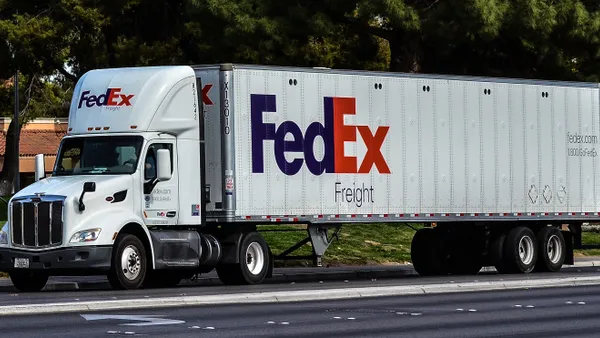WASHINGTON, D.C. — A major issue for the trucking industry in recent years is hours-of-service (HOS) regulations, the rules that spell out how long commercial truck drivers are allowed to be on the road.
Just in the last year, there have been protests and thousands of comments filed asking the federal government to change its rules. Currently, drivers can drive 11 hours in a 14-hour period and if they start driving there's no way to stop the clock on that 14 hours. Drivers claim that they need more flexibility.
The Department of Transportation is currently considering changing these regulations and Secretary of Transportation Elaine Chao has said the agency is interested "in increasing flexibility and is giving it serious consideration."
Jannine Miller, the deputy assistant secretary for transportation policy at the Department of Transportation, said the HOS regulations were one of the most important things the administration will consider concerning freight movement while speaking Thursday at a supply chain event hosted by the U.S. Chamber of Commerce. Miller did not provide any updates to the review process currently underway.
The DOT is planning to put out a rule change around HOS as early as next month, but one company says it has a solution to nullify all of these concerns.
Embark, which makes autonomous trucks, says its technology is a way for shippers and carriers to speed up shipments and not have to worry about HOS regulations, according to the company's Head of Public Policy Jonny Morris.
"If you imagine a vehicle that’s not limited by hours of service it will be able to make a cross country trip in a matter of two days instead of the five or six that are required by a normal human driver," Morris said at the same event.
Embark is working on what it calls "exit to exit" autonomy. The trucks are able to drive autonomously on the long stretches of highway and interstate or what Morris calls the "long, boring middle part" of a cross-country long-haul route.
Greg Hastings, an associate partner at McKinsey & Company who also spoke at the event, agreed that autonomous driving would result in faster shipping time, but did not comment specifically on its impact on HOS. Though, without a driver, it does follow that HOS would no longer be a worry and the DOT has already taken this into consideration.
DOT guidance specifically says in its latest guidance on autonomous vehicles that HOS regulations would not apply. Vehicles must comply with existing commercial motor vehicle regulations.
But the DOT is more focused on the potential safety improvements autonomous trucking can provide and not necessarily its ability to speed up shipping, Miller said.
"We understand and are supporters of efficient freight flow, absolutely,” she said, adding that "at the same time safety is absolutely critical."
Beyond the benefits of avoiding HOS regulations, there will be other potential upsides to autonomous trucks for shippers, according to Hastings.
"We're coming out of a couple years where ... capacity in the supply chain has been as tight as its ever been, so every company is looking for anything that drives up some of those efficiencies so that they can move their goods more quickly but also cost-effectively," Hastings said.
But the part of autonomy many companies are currently struggling with is how and when to make the transition and what exactly this means for other aspects of their freight and operations networks. Changes to warehouse operations, depots and staffing are all considerations they need to think about, he said.
While these aspects of autonomous trucking can be complicated it's important that large freight operations begin considering pilots and tests of this technology if they aren't already, he said.
"It's important to be in the testing and learning mode currently so that you're ready to flip the switch relatively quickly instead of starting two or five years from now when a couple of those barriers are overcome," Hastings said, referring to barriers like technology and regulations.
Many companies appear to be following this advice. Embark's trucks are already being used by large companies. It partnered with Frigidaire on a pilot in 2017 and one of its trucks was recently spotted hauling an Amazon trailer. And Morris said they were working with "a number of fortune 500 companies." Walmart is already using some semi-autonomous trucks designed and built by Tesla, according to The Drive.













